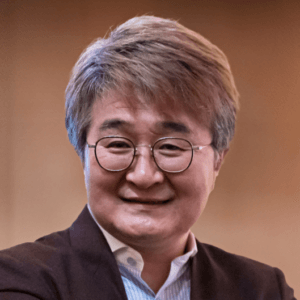
Chang Gun Song
Professor of Church and Mission, Korean Studies Director, Instructional Faculty
At a Glance
Biography
Professor Chang Gun Song served for nine years as an associate pastor at Ansan Dongsan Church, where he led as Director of the Future Ministry Research Institute and Youth Ministry. He introduced cell church ministry and the “Big Forest Movement” (a church-planting and multiplication initiative) to the Korean church.
In 2009, he planted an emerging church called “Blue Light Church” in the Hongdae area of Seoul by renovating a bar. He operated entertainment and performance venues and collaborated with artists and cultural planners to establish a healthy artistic culture in the area.
In 2015, he planted “Blue Light Gangnam Church,” a missional church in the Gangnam district, focusing on Generation MZ (Millennials and Gen Z), singles, young couples, and international students. His ministry emphasizes lay ministry centered on spiritual gifts and focuses on planting simple, easily reproducible missional churches in various urban locations.
Since 2016, he has served as the representative of “SETTSAE KOREA” (New Generation, New Church, New Region), connecting leaders and networks across denominations to create a platform ministry that revitalizes generations, churches, and communities in service to Korean churches and local societies. Based on these ministry experiences, he earned his doctorate in missiology with a dissertation titled “Contextualization of the Korean Missional Church from the Perspective of Missional Communication.”
Education
B.A., Keimyung University, 1991
M.Div., Chongshin Theological Seminary, 1996
Ph.D., Juan International University, 2024
Faculty Q&A
The “For the Church” vision informs my approach to the classroom with a distinctly missional perspective. The classroom is not merely a place for academic study; it is a missional platform where the missionary activity of God unfolds. Within this space, individuals from diverse backgrounds and cultures engage in biblical and theological dialogue, shaping a missional identity and model that are responsive to the evolving contexts facing the Church. The classroom itself is recognized as a sacred space where the triune God’s missional work is actively at work. The classroom is not characterized by monological teaching; rather, it is a communal testimony and a missional dialogue, where all participants become partners in the mission of Christ—learning from, supporting, and depending on one another, and experiencing together the fellowship of God’s people.
MBTS upholds the unchanging gospel amid the rapid changes of a secular and pluralistic society, while boldly pursuing creative and innovative challenges in service to the Church and missions. It moves beyond Western theological frameworks, seeking to contextualize the gospel within the languages and cultures of Asia, Africa, Latin America, and other regions, embodying a true missional frontier spirit. MBTS is committed to an inclusive education that welcomes all as partners in Christ’s mission, reflecting the essence of incarnational communication. Contributing to this vision through my teaching is a profound joy, a deep honor, and an exciting privilege.
The next generation of pastors and ministry leaders often resemble blossoms yet to bloom— sometimes unstable and unpolished in their early stages. Yet they are filled with a spirit of creativity, a willingness to take risks, and a boldness to embrace new challenges for a new era. Walking alongside them, coaching them, and witnessing them pioneer new churches and develop innovative ministry models in ways no one has ever attempted before is not only a profound privilege for me, but also the very source of the passion that drives my work.
